Recurring Nosebleeds: 5 Reasons You Shouldn’t Ignore Them!
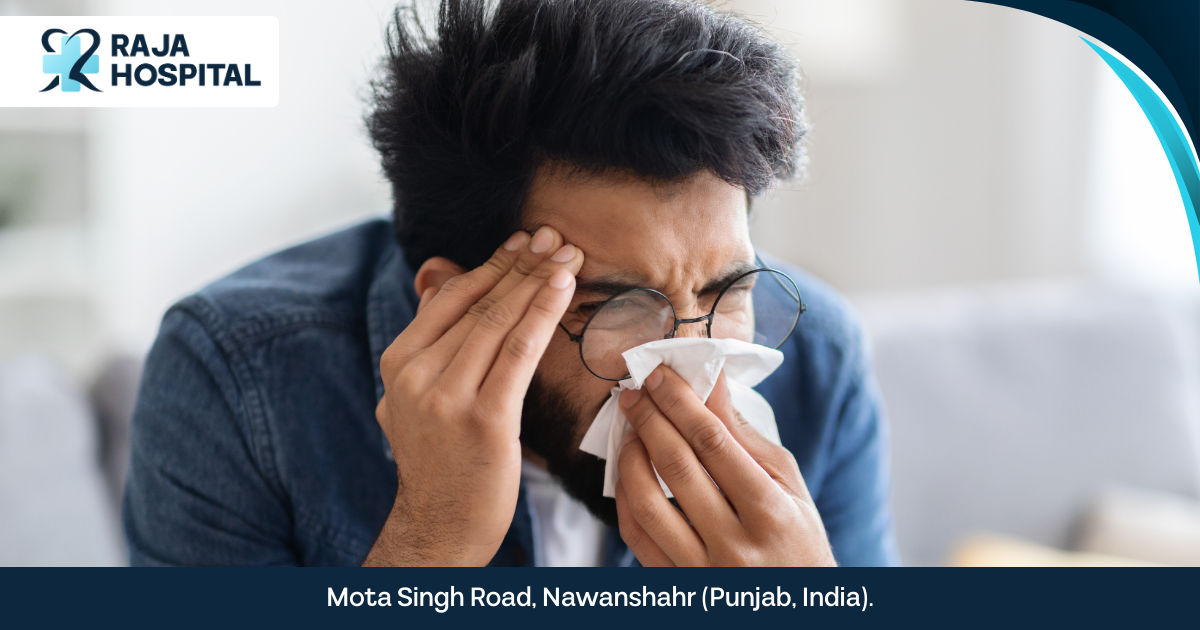
REVIEWED BY DR. SHOKET ALI (MD MEDICINE) on 14 september 2025.
Nosebleeds may seem like a small inconvenience, but what if they’re actually a signal your body is trying to send? Most people experience occasional nosebleeds and move on, blaming the weather or something they’ve eaten.
In fact, I’ve seen this firsthand. A relative of mine had frequent nosebleeds but always shrugged them off. It wasn’t until he woke up one morning to a blood-stained pillow that we realized something was wrong. It turned out to be a symptom of uncontrolled blood pressure, a condition we might have caught earlier if we had paid attention.
The truth is, nosebleeds can be triggered by a range of everyday factors, such as dry air, high blood pressure, allergies, or even habits we develop as children, like nose-picking. Yet, many people still believe outdated myths and delay getting help when they need it most.
This article will walk you through what really causes nosebleeds, when you should take them seriously, and how to prevent them with seven simple habits. Whether you’re dealing with nosebleeds yourself or know someone who is, this guide can help you understand when it’s time to act.
Why Nosebleeds Happen (And No, It’s Not Just ‘Hot’ Food)
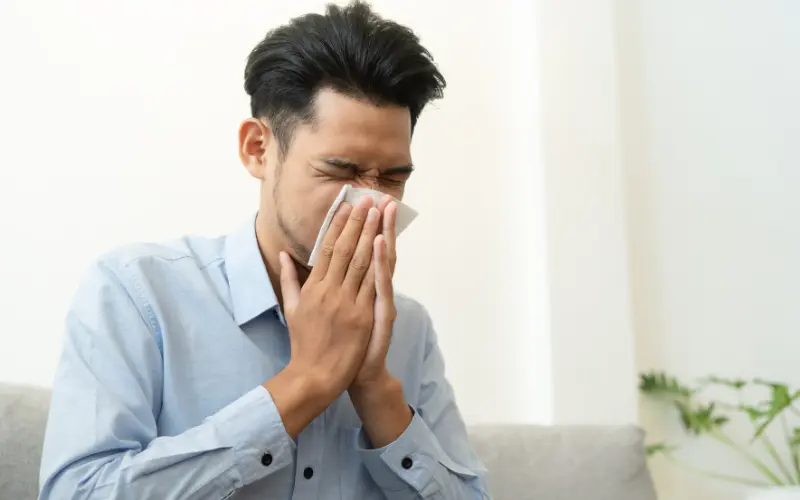
Many people believe nosebleeds are caused by eating spicy or “hot” foods. While this belief is deeply rooted in cultural habits, it overlooks the actual medical reasons behind why your nose may start bleeding.
Here are the real triggers you should know about:
1. Dry Nasal Passages
The nose is lined with very thin blood vessels that are close to the surface. When the air is dry, these vessels can crack and bleed easily.
- Most common in winter or in places with artificial heating or air conditioning
- Low humidity levels irritate the nasal lining, making it fragile
2. Sudden Temperature Changes
Rapid shifts in temperature can affect the blood vessels inside your nose.
- Moving from a hot environment to a cold one, or vice versa, can make vessels expand and contract quickly
- This sudden change puts stress on already sensitive vessels
3. Physical Irritation
Simple habits or actions can damage the inside of your nose.
- Frequent nose blowing, especially during colds or allergy seasons
- Nose picking or even lightly scratching inside the nostrils
- Inserting tissues or fingers into the nose
4. The Myth of Spicy Food
While spicy food can cause a temporary rise in body temperature or make you sweat, it doesn’t directly cause nosebleeds.
- There’s no scientific evidence linking spicy food to ruptured nasal blood vessels
- Blaming food can delay identifying the actual causes
In most cases, nosebleeds are the result of environmental conditions, personal habits, or minor health issues. Understanding these triggers is the first step in reducing how often they happen.
Common Causes of Nosebleeds You Probably Ignore
Not all nosebleeds are random. In fact, many are rooted in health issues or daily habits that often go unnoticed. Here are some of the most overlooked causes that could be behind your frequent nosebleeds:
1. High Blood Pressure

Elevated blood pressure can put extra strain on the blood vessels in your nose. Over time, this pressure makes them more likely to rupture, especially if they’re already weakened or inflamed.
- Often goes undiagnosed due to a lack of symptoms
- Can lead to longer or heavier nosebleeds
- Needs medical management, not just first aid
2. Nose Picking and Childhood Habits
It may seem harmless, but even gentle picking can injure the nasal lining.
- Most common cause in children, but it affects adults too
- Repeated irritation leads to frequent bleeds
- Fingernails can easily scratch and rupture tiny vessels
3. Overuse of Nasal Sprays or Medications

Decongestant sprays can provide short-term relief, but long-term use dries out the nasal passages.
- Causes thinning of the mucosa and breaks down the protective lining
- Increases the risk of both minor and major bleeds
- Blood-thinning medications like aspirin also increase the risk
4. Allergies, Infections, and Environmental Irritants
Anything that causes inflammation inside the nose can lead to bleeding.
- Allergic rhinitis, sinus infections, and airborne irritants like dust or smoke
- Sneezing, wiping, or blowing the nose repeatedly aggravates the tissue
- Often seasonal or location-specific
5. Nutritional Deficiencies and Underlying Conditions

Sometimes, frequent nosebleeds signal something more serious.
- Lack of vitamin C or K can weaken blood vessels and affect clotting
- Bleeding disorders such as hemophilia or platelet issues
- Rarely, but importantly, tumors or abnormal growths in the nasal passage
If you’re experiencing nosebleeds more than once or twice a week, these causes are worth investigating. What seems like a minor inconvenience could be your body hinting at a deeper issue.
When to Worry: 5 Serious Signs You Shouldn’t Ignore

Most nosebleeds are harmless and stop on their own. But not all of them. Sometimes, a nosebleed is more than just a surface issue. It’s a warning sign your body wants you to notice.
Here’s when you should stop brushing it off and consider medical attention:
1. Nosebleeds That Happen Frequently
An occasional nosebleed isn’t alarming. But if it’s happening more than once or twice a week, it’s time to ask why.
- Could signal an undiagnosed blood pressure issue
- It might point to chronic inflammation or nasal damage
- Frequent episodes weaken vessels over time, making bleeds worse
2. Heavy or Prolonged Bleeding
If the bleeding doesn’t stop within 15 to 20 minutes with proper pressure, it may be more serious.
- Could indicate a clotting disorder or internal injury
- Risk of significant blood loss if ignored
- Always better to seek help than to wait it out
3. Bleeding From Both Nostrils
Most simple nosebleeds are from the front of the nose and affect only one nostril. Bleeding from both sides could suggest a deeper issue.
- Possible sign of high blood pressure or trauma
- It could also be linked to posterior nasal bleeding, which needs urgent care
4. Nosebleeds Accompanied by Other Symptoms
Pay attention if your nosebleed comes with:
- Headaches or dizziness
- Vision changes
- Bruising easily or bleeding from gums
- Fatigue or shortness of breath
These could be signs of a systemic problem affecting your blood vessels or clotting ability.
5. Nosebleeds After an Injury
Any nosebleed that follows a fall, hit to the head, or accident should not be ignored.
- Possible nasal fracture or internal bleeding
- Risk of complications if left untreated
If any of these signs sound familiar, it’s not just a nosebleed. It’s a message that needs a response. Getting a medical evaluation early can prevent long-term problems or more dangerous health outcomes.
What To Do During a Nosebleed: First Aid Tips That Work
When a nosebleed starts, many people react out of panic and instinct. Unfortunately, this often leads to common mistakes like tilting the head back, lying down, or stuffing tissues into the nose. These actions can actually worsen the situation.
Here is the correct way to handle a nosebleed:
1. Stay Calm and Sit Upright

Do not lie down. Instead, sit up straight and keep your head slightly tilted forward. This helps reduce blood pressure in the nasal vessels and prevents blood from flowing down your throat.
2. Pinch the Soft Part of Your Nose
Use your thumb and index finger to gently pinch the soft, fleshy part of your nose just below the bridge. Hold this pressure for 10 to 15 minutes without releasing. Breathe through your mouth while you do this. Avoid checking too early, as it may restart the bleeding.
3. Apply a Cold Compress

Place a cold pack or a cloth-wrapped ice cube on the bridge of your nose. The cold temperature causes blood vessels to constrict, which can help stop the bleeding faster.
4. Avoid Movement or Strain
Do not talk, swallow excessively, sniff, or blow your nose during and shortly after the bleed. Movement can disrupt the clot and cause the bleeding to resume.
5. Know When to Seek Medical Help
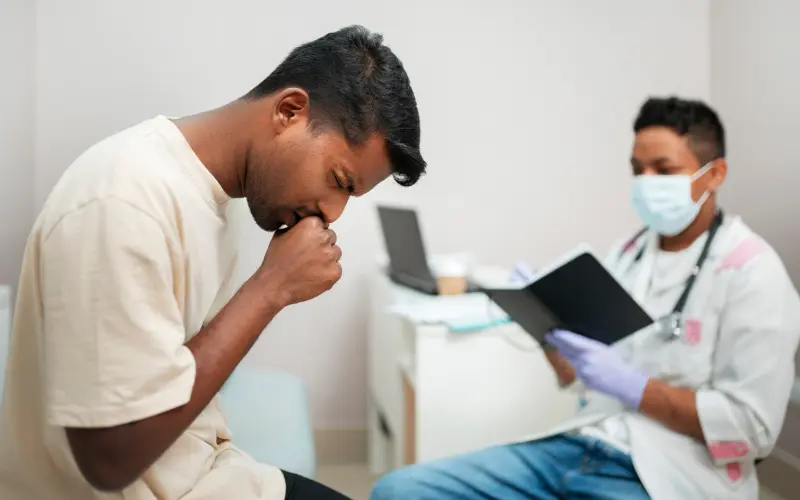
If the bleeding continues for more than 20 minutes or if you experience repeated nosebleeds on the same day, consult a doctor. You should also seek help if the nosebleed follows an injury or is accompanied by symptoms like dizziness or fainting.
Taking the right steps during a nosebleed can make a big difference. These actions not only help stop the bleeding effectively but also reduce the risk of further complications.
How to Prevent Nosebleeds – 7 Smart Daily Habits
If you’re tired of nosebleeds showing up at the worst times, prevention is your best defense. Small daily habits can make a big difference in keeping your nasal passages healthy and your blood vessels stable.
Here are seven simple, effective strategies to help reduce the chances of a nosebleed:
1. Use a Humidifier at Home
Dry indoor air, especially during winter or in air-conditioned environments, is one of the biggest triggers for nosebleeds.
- Place a humidifier in your bedroom to keep air moisture levels balanced
- This prevents the nasal lining from drying and cracking
2. Keep Your Nasal Passages Moisturised
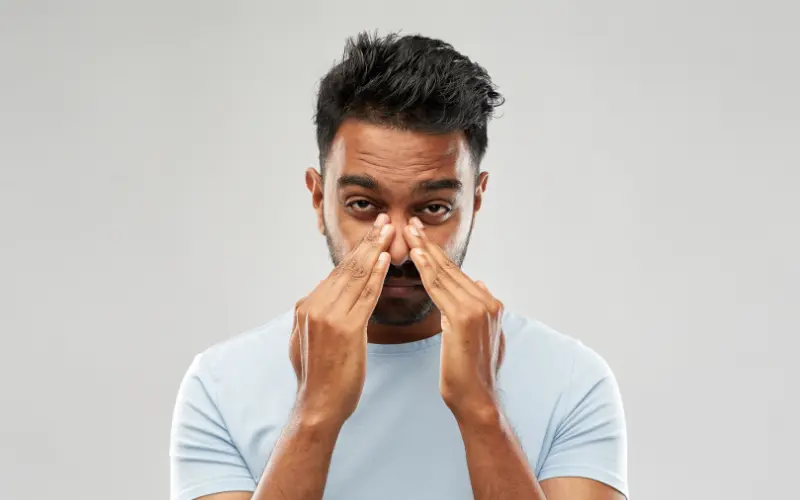
Don’t let your nose dry out. Use saline nasal sprays or apply a thin layer of petroleum jelly inside the nostrils using a cotton swab.
- Do this especially before going to sleep or before heading into dry environments
- Avoid using scented or medicated products unless prescribed
3. Stay Hydrated
Drinking enough water keeps your entire body, including your nasal membranes, properly hydrated.
- Aim for 6 to 8 glasses a day
- Dehydration makes your nasal lining more fragile
4. Avoid Picking or Blowing Your Nose Forcefully
Gentle care goes a long way. Be mindful during allergy or cold seasons.
- Use soft tissues and blow one nostril at a time
- Avoid inserting fingers or objects into the nose
5. Monitor Your Blood Pressure
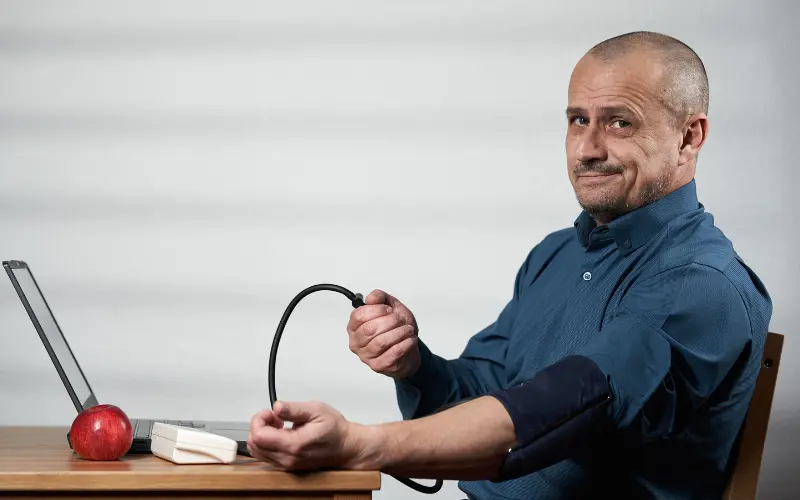
Uncontrolled high blood pressure is a silent trigger behind many nosebleeds.
- Get your blood pressure checked regularly, especially if you’re over 40
- Manage it through diet, exercise, and medication if necessary
6. Limit Use of Decongestant Sprays
Over-the-counter nasal sprays may provide quick relief, but long-term use can dry out the nose and lead to bleeding.
- Use only as directed and not more than a few days at a time
- Switch to saline sprays for long-term use
7. Avoid Smoking and Secondhand Smoke
Cigarette smoke irritates the nasal passages and makes them more prone to bleeding.
- Quit smoking if possible
- Avoid staying in smoky environments
These habits aren’t complicated, but they are consistent. Building them into your routine can reduce the frequency of nosebleeds and improve your overall nasal health.
Common Myths About Nosebleeds
Nosebleeds have been misunderstood for generations. From blaming spicy food to using outdated remedies, misinformation often leads to confusion or even harmful practices.
Let’s separate fact from fiction by breaking down the most common myths.
1. Spicy Food Causes Nosebleeds
This is one of the most widespread beliefs, but it’s not medically accurate.
- Spicy foods may temporarily increase body temperature or cause nasal irritation, but they do not directly cause blood vessels in the nose to burst
- The real culprits are dry air, fragile vessels, or underlying health issues
2. Tilt Your Head Back During a Nosebleed
Many people are taught to lean back when they have a nosebleed. This is dangerous.
- Tilting the head back causes blood to run down the throat, which can lead to choking or stomach irritation
- The correct method is to sit upright and lean slightly forward
3. Nosebleeds Only Happen to Children
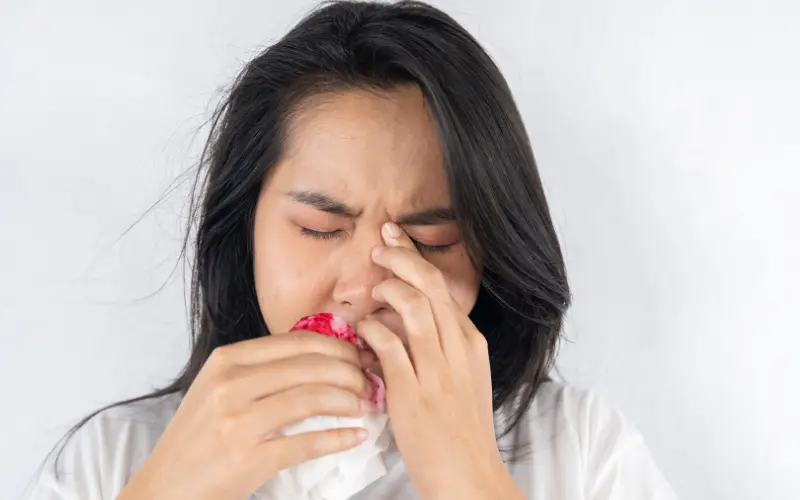
While children are more prone to nosebleeds due to habits like nose-picking, adults are not immune.
- High blood pressure, medication side effects, dry environments, and other health conditions can trigger nosebleeds in adults
- Frequent adult nosebleeds should never be ignored
4. You Should Stuff Tissues Deep Into the Nose
This can actually make things worse.
- Inserting objects or tissues deep into the nostrils may further irritate or injure the delicate lining
- It can also remove clots and restart bleeding
5. All Nosebleeds Are Harmless
While many are minor and self-limiting, some can be signs of more serious conditions.
- Chronic nosebleeds may indicate blood pressure issues, clotting problems, or even nasal tumors
- If nosebleeds are frequent, prolonged, or occur with other symptoms, medical evaluation is necessary
Believing the wrong thing can delay proper treatment or even cause harm. Knowing the facts helps you respond more effectively and take better care of your health.
When to See a Doctor (Especially If You Live in Ignorance Mode)

It’s easy to ignore the occasional nosebleed, especially when it stops quickly. But when it becomes a pattern or happens alongside other symptoms, it’s no longer something to brush off. It’s a signal that needs professional attention.
Here’s when it’s time to stop self-diagnosing and see a doctor:
1. Frequent Nosebleeds
If you’re getting nosebleeds more than once or twice a week, you shouldn’t ignore them.
- May indicate an underlying issue like high blood pressure or a bleeding disorder
- It could also be a sign of chronic irritation or vascular weakness
2. Bleeding That Won’t Stop
If the bleeding continues for more than 20 minutes, despite proper first aid, seek medical help.
- Prolonged bleeding increases the risk of significant blood loss
- Might require medical intervention, such as nasal packing or cauterization
3. Associated Symptoms
If your nosebleed is accompanied by headaches, dizziness, easy bruising, or bleeding from other areas like the gums, it could indicate a systemic issue.
- These symptoms may point to clotting disorders, infections, or more serious conditions
- A full blood workup may be needed to identify the cause
4. Post-Injury Nosebleeds
Bleeding that starts after trauma or a hit to the face or head should always be evaluated.
- It could be a sign of a nasal fracture or internal damage
- Risk of complications increases without medical assessment
5. Underlying Conditions or Medications
If you have a history of hypertension, are on blood-thinners, or have been diagnosed with any bleeding disorders, frequent nosebleeds are not something to ignore.
- Medications like aspirin, warfarin, or even certain herbal supplements can interfere with clotting
- Your doctor may need to adjust your treatment or order diagnostic tests
Frequently Asked Questions
1. Can dehydration cause nosebleeds?
Yes. When the body is dehydrated, the nasal passages can dry out, making the blood vessels inside more likely to crack and bleed. Staying well-hydrated helps maintain moisture in the nasal lining.
2. Are nosebleeds common in children?
Yes, especially between the ages of 3 and 10. Children often pick their noses or experience frequent colds, both of which can irritate the nasal lining. Most childhood nosebleeds are harmless but should still be monitored.
3. Is it normal to have nosebleeds in winter?
It is common during winter due to dry indoor heating and low humidity. These conditions dry out the nasal passages, increasing the risk of bleeding.
4. Should I be worried if I have two nosebleeds a week?
Frequent nosebleeds are not normal and should be evaluated by a doctor. They could indicate high blood pressure, irritation, or another underlying issue.
5. Can nosebleeds be a sign of cancer or a tumor?
While rare, persistent or unexplained nosebleeds could be a symptom of nasal tumors or other serious conditions. If the bleeding is frequent, prolonged, or accompanied by other symptoms, medical evaluation is strongly recommended.
Struggling with same?
Book Your Appointment With Our Expert Doctors

Conclusion
Nosebleeds may appear minor, but they often reflect something more important. Whether it is dry air, elevated blood pressure, or habits you have overlooked for years, your body is sending you a message. Ignoring frequent nosebleeds does not make the problem go away; it only delays necessary action.
By understanding the real causes, recognizing when to seek help, and adopting simple daily habits, you can reduce the chances of nosebleeds interfering with your health or routine. Prevention starts with awareness, and treatment begins with taking the signs seriously.
If nosebleeds are becoming a regular part of your life, it is time to stop guessing. Speak with a Specialist at Raja Hospital and get the answers and care you deserve.
